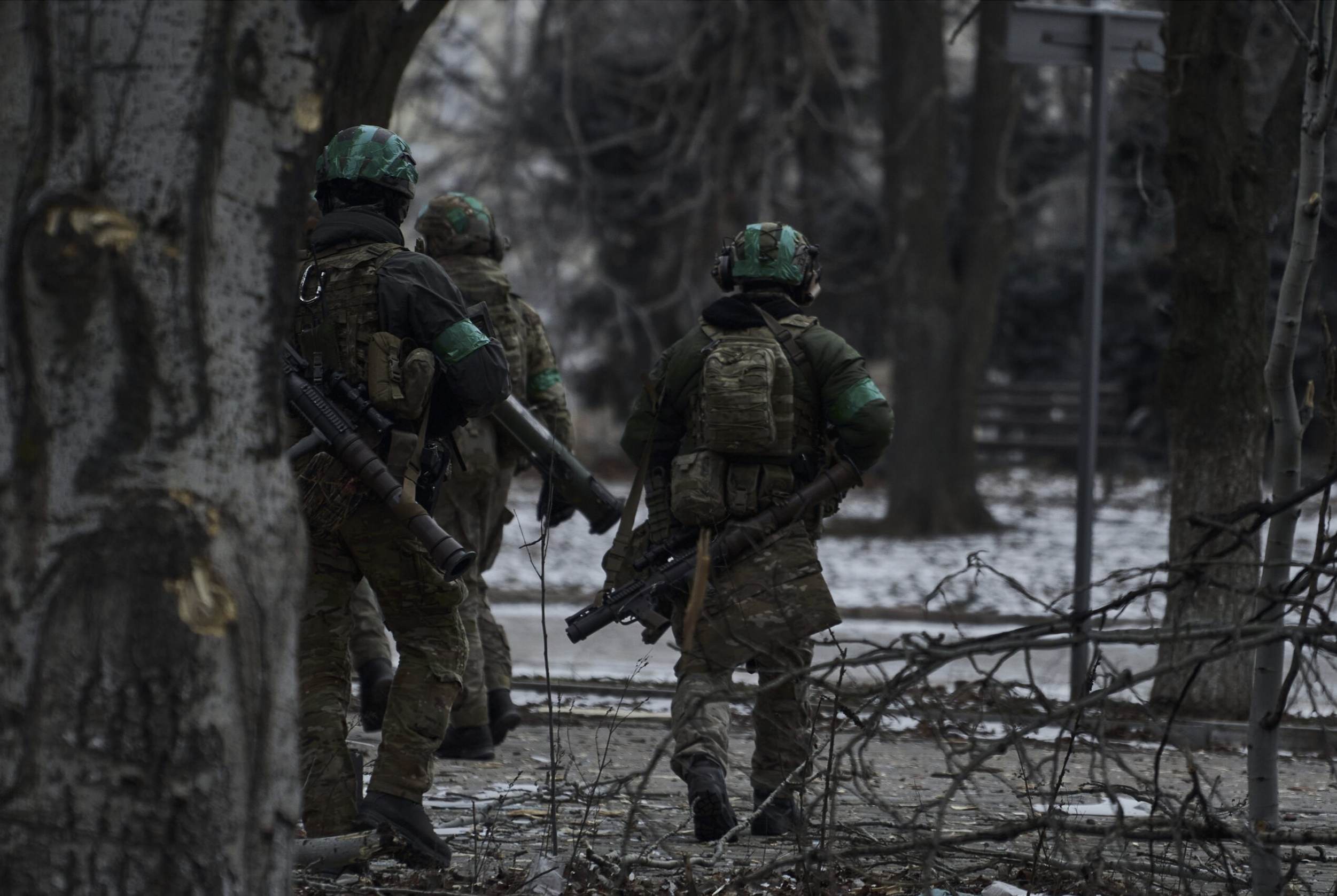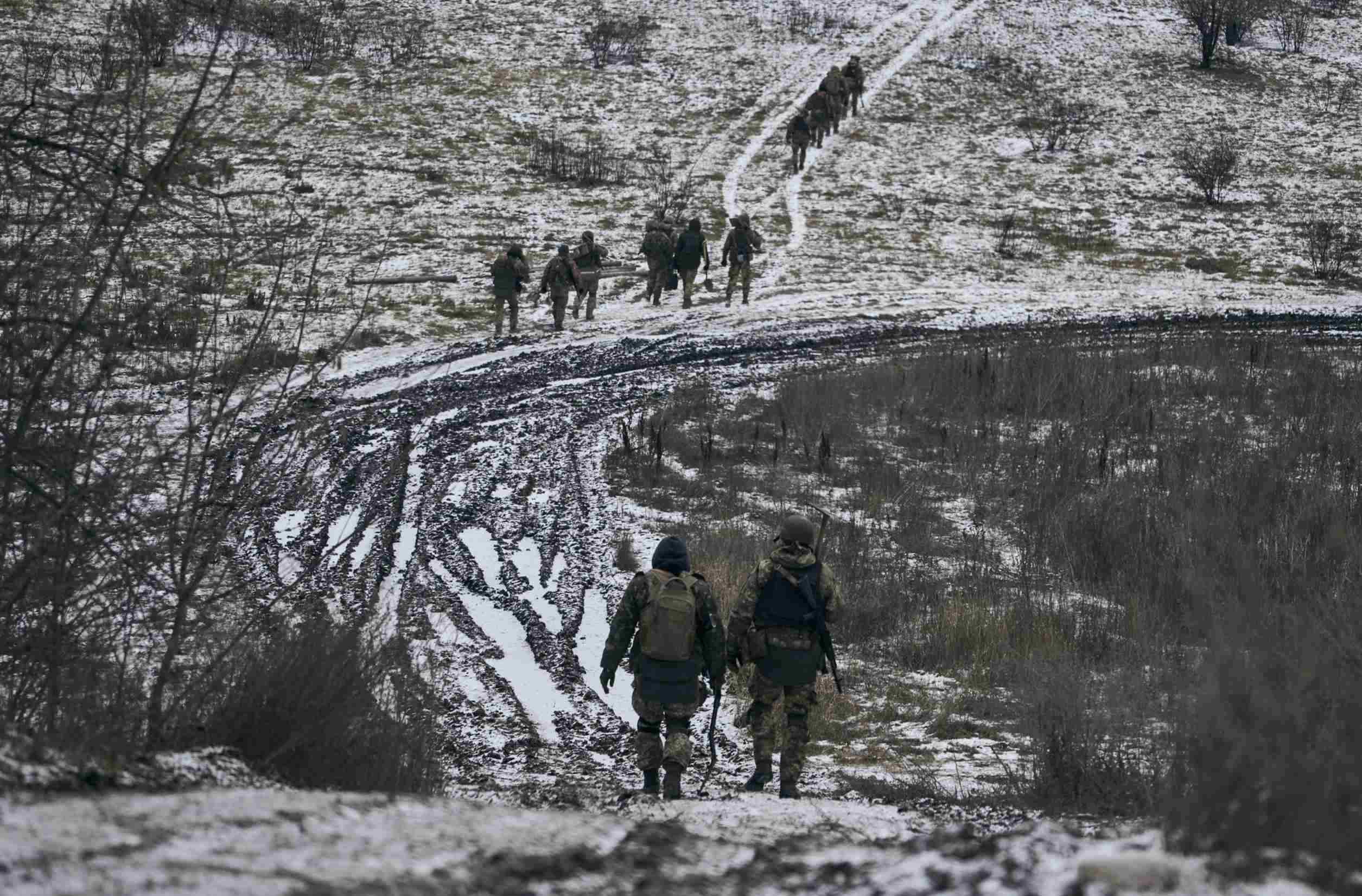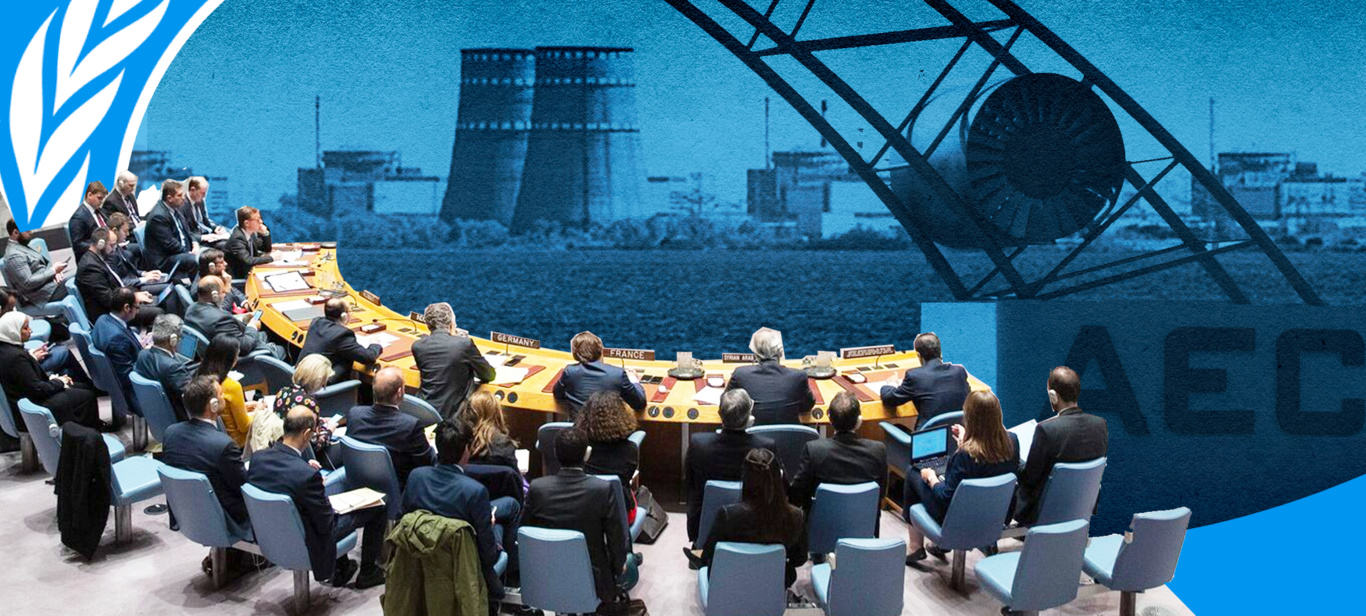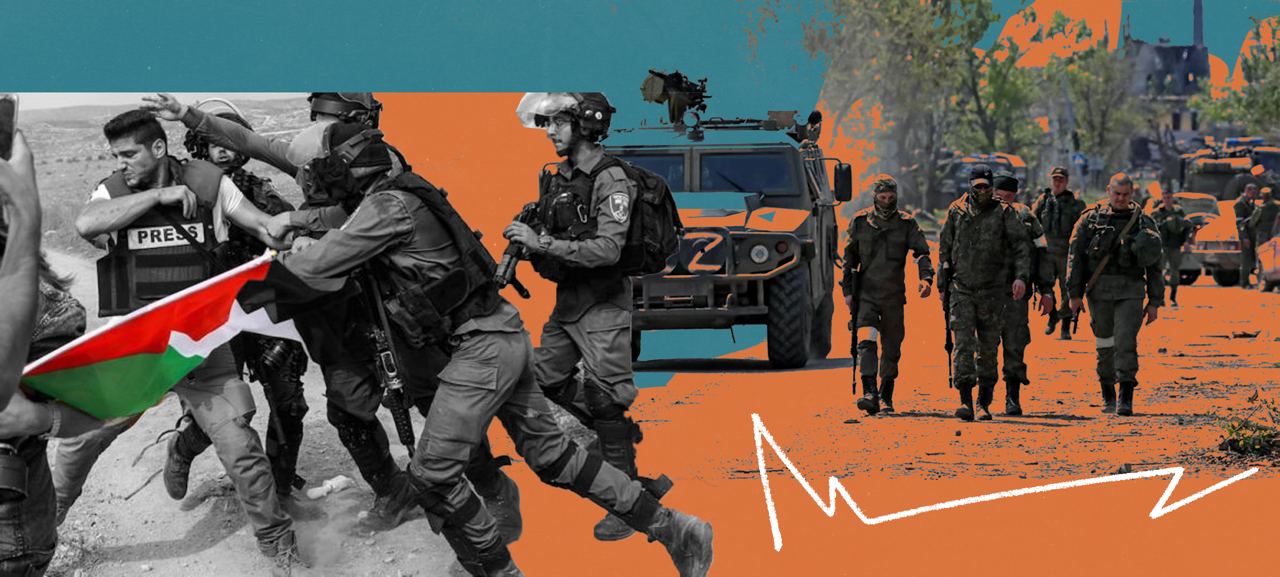The end of the 20th century, marked by the fall of the Berlin wall, the end of the Cold War, and the defeat of “real socialism”, encouraged intellectuals to proclaim “the end of history”.
It seemed to many people that overcoming the campist logic of military, political and economic blocs was a point of no return, that it would prevent global-scale crises in the future. The belief that a stable international security model has been invented was particularly dominant. That idyllic worldview didn’t exist for long though. The beginning of the 21st century passed under the banner of the global “war on terror”, the rise of new economic giants such as China, the revival of radical forms of nationalism and fundamentalism. One of the key events in this sequence is the Russian-Ukrainian war and its culmination, the full-scale invasion on February 24, 2022. Threat of nuclear confrontation, ecological and humanitarian disaster, and the inability of the existing international mechanisms to stop the war – all these challenges to the global security system urge to seek an alternative. The analysis of the current situation from the left, socialist perspective, and discussion of new visions took place at the Feuerbach 11 conference, organized by the Commons journal.
Global economic reconfiguration and global security challenges
Events that started after February 24 were caused by deeper structural changes. That’s why it’s important that after the war's end, the global security system doesn’t return to the condition that preceded the Russian invasion and made the escalation of the Russian-Ukrainian war possible. Ilya Matveev, political scientist, a researcher in the “Public sociology laboratory”, and editor of “Posle.Media”, spoke about these and other geopolitical changes of recent years and their consequences.
From this perspective, the researcher points out recent tendencies in relations between the USA and the People’s Republic of China. The general shift in policies of those countries is illustrated by two unprecedented recent events. First, this year the US abandoned its line of “strategic ambiguity” towards Taiwan. It was marked by the American administration stating that in an event of a war on the island’s territory, the US will have to intervene.
Second, due to the potential risk of political and economic pressure from the West, China conducts the so-called “stress tests” to check its stability in the event of American sanctions such as those implemented against Russia after February 24. Many American investors are leaving China already while more and more Chinese companies refuse American investments and assets because, in the event of sanctions from the US, they will be frozen. Therefore, it's fair to talk about the global tendency of economic separation, the process opposite to globalization of the end of the 20th century.
Another example of the separation process offered by Ilya Matveev is the US Secretary of Treasury Janet Yellen supporting the so-called “friend-shoring”: moving of supply chains into the Western geopolitical space and breaking of economic relations with China. That idea becomes more and more influential among American intellectual circles because it is believed that the age of globalization is over, so there’s a need to create something like a trade bloc that would include politically friendly countries and involve cutting economic ties with the unfriendly ones, first of all, China.
In Ilya Matveev’s opinion, it’s obvious that economic blocs formed – American, Chinese, and possibly Russian – will cause additional pressure between imperialists and redundant threats to global security. Of course, the trade between China and the US still reaches trillions of dollars, it’s impossible to get rid of it instantly. Also, some influential politicians, such as Olaf Scholz, criticize the new “friend-shoring” paradigm. Matveev summarizes:
“Of course, this process has its limits. But I’m concerned that when started, the economic separation might become self-accelerating. It might happen gradually at the start, the volume of trade will decrease slowly, and then isolating will suddenly gain momentum, causing a full rapture of all economic relations. Then, nothing will stop the world from descending into a new global conflict.”
Discussions in the international left and threats to Eastern European region
Amid growing challenges, it’s important to form new visions for the global security system from a left perspective. As the Russian invasion illustrates the possible consequences of fragmentation and economic separation, it’s important to give it proper political evaluation, deepen the understanding of flaws that existing war-preventing tools have. And though there is no unified view of these events among the left, the majority of socialist figures acknowledge the existence of basic principles.
One of them is the distinction between legitimate wars, such as wars of national defense or national liberation, and imperialist or colonial wars – wars of oppression. Such distinction is one of the fundamental ones, argues Gilbert Achcar, a researcher of development and international relations at the School of Oriental and African Studies at the University of London. Such classification not only provides tools to firmly recognize the fight of Ukrainians against the Russian Federation as legitimate – Putin's rhetorics and actions are certainly colonial towards Ukraine – but also allows a better approach to the question of the rise of Ukrainian nationalism. In the situation of the national liberation war, the nationalism of the oppressed people is more justified, unlike the nationalism of the oppressor which is always chauvinistic in its essence.
The described classification of wars provides the framework in which discussions take place, particularly about reasons for the full-scale military invasion of RF into Ukraine. Some socialist organizations interpret these events as necessary steps Russian authorities were forced to take due to threats to its national security from Western imperialism. Proponents of this position compare the actions of Russia with the hypothetical situation: imagine China turning Mexico into its military base, what would the US do in such a case? But Gilbert Achcar points to the inconsistencies of such a position because its supporters, in case of a pre-emptive invasion of the US in Mexico, would have to justify the actions of the United States, the country which is the embodiment of global imperialism for them. The essence of this argument is the legitimation of aggression, shifting of focus from Russian imperialism to the American one, and eventually, pushing all sides to immediately start negotiations in which Ukraine won’t have political subjectivity.
International left did and do call for the disbandment of NATO because after the collapse of the Soviet Union, this military alliance changed not only its function but also the ways of action, Gilbert Achcar pointed out. Since the 1990s, the alliance intervened in the Balkans, Afghanistan, and Iraq. The expansion of the military bloc also didn’t stop. The researcher summarizes:
“So, we should acknowledge the fact, which in no way justifies the actions of the Russian Federation, that V. Putin is partly a result of historical and political circumstances shaped by the US. The rise of nationalism is a reaction to a threat from the west which Putin’s propaganda uses to strengthen national sentiments.”
While acknowledging the role the US played in creating the conditions that enabled the emergence of Putin’s Russia, it’s important not to waive the responsibility from the latter for its politics. Russia under Putin’s presidency is an extremely aggressive country that participated in or started wars itself – the war in Syria, two Chechen wars, the war in Ukraine. Ilya Matveev noted that Russian authorities never offered an alternative architecture for global security, the one without NATO, while always criticizing the Alliance. On the contrary, the Russian leadership has a pathological urge to prove that it can do the same things Alliance does. It’s proved, among other things, by the fact that Putin’s speech after the annexation of Crimea contained excerpts from the Kosovo declaration of independence.
Even though the rhetorics of Russian authorities use cliches about multi-polarity and the fight against American hegemony for peace, Russian leadership's actions have been purposefully increasing tensions in the post-Soviet space. Zofia Malisz, a member of the leftist Polish parliamentary party “Razem”, says that NATO, after the inclusion of Poland and other countries, pursued extremely careful tactics towards its vis-a-vis Russia. For example, there were no American soldiers in Poland until 2014, and surely, there are no nuclear weapons. Escalation in Eastern Europe was always pushed by RF.

Ukrainian military in Bakhmut, January 12, 2023. Photo: AP Photo/LIBKOS
In Zofia’s opinion, the positions of the global left concerning international security and the mechanisms they offer are very abstract or extremely ideologized, which makes them pretty much useless in situations of an unraveling armed conflict. Western left’s abstract position often amounts to naive pacifism, and ideologized one – to discourse like “no to NATO”. The challenges that international institutions face now are much more complicated than the analysis that proponents of the aforementioned visions offer. They mostly lack the range of immensely relevant forms of resistance such as opposing the fossil fuel industry and the military-industrial complex tied to it.
“Peace, demilitarization, and disbandment of military blocs like NATO or CSTO are, without a doubt, goals which the left should pursue in the long term, but these aren’t timely goals.”
Politicians who took the “no to NATO” position are inconsistent at least in mixing the situations of all Alliance’s member countries, their interests, and security challenges. So, to reach an understanding, it’s necessary to additionally consider each country in the North Atlantic Treaty, its political situation, and to offer alternatives to the military bloc. Zofia Malisz argues that so far we don’t have a coherent response from the Western left in which such work had been done. Moreover, the “Razem” party raised these questions long before February 2022, and even then, when the global situation was completely different, there was no coherent strategy.
Considering the active threat Russian imperialism poses, countries like Finland, Latvia, Poland, Romania have every right to arm themselves and demand a supply of weapons from NATO, Zofia Malisz thinks. Those who take an overly ideologized position and deny that right, ignore the security interests of Eastern European countries. Since some left parties acknowledge the justification for the armament of Eastern European countries, тnow there’s room for dialogue on this issue with Western socialists. But, as the Polish activist noted, a wider international discussion and a common search for alternatives are still absent. It makes effective solidarization during the war impossible and fragments the global left movement:
“In places like Ukraine, Poland, and Scandinavian countries, the left just can’t afford to avoid program analysis of defense policies and to concentrate solely on opposing NATO imperialism.”
Socialist visions for the international security system
Gilbert Achcar stresses that the contemporary socialist program has to be divided into two categories, utopian and tactical. This, in the researcher’s opinion, will allow avoiding unproductive discussions among the left. It’s extremely important today to renew the dialogue about short- and midterm visions. Western left’s pacifist position, caused by an inability to formulate short-term visions, is very dangerous and creates a vacuum of ideas not only in the area of security and defense capabilities but also concerning other important issues, notes Zofia Malisz. For example, because Western left brand the “Razem” party as pro-NATO, they refuse to discuss other topics with it: economic, ecological, cultural, etc. Zofia said about the dangers of such a situation for Ukraine:
“When there is no international debate among the left, when the left doesn’t participate in the discussion, cuts itself from it, it allows the capital to prevail which happened in Poland at the beginning of 1990s. We didn’t have leftist alternatives for the transformation process from our Western comrades. And it can happen again in Ukraine if in near future there won't be a dialogue and understanding of different political security realities .”
Urgent action and proposals for ensuring peace in the region and for creation a socialist alternative for Ukraine are needed. Without the unconditional support of Ukrainian left and union movement, new neoliberal shock doctrines wait for the country.
The “Razem” party works on a vision for a left alternative beyond the framework of the false dichotomy between naive pacifism and militarism. It’s important, as French socialist activist and researcher Catherine Samary notes in her works, to create a more democratic way of managing armed forces. To achieve that, the “Razem” offers an approach to constructing armed forces as a public service institution that meets the constitutional functions of the state, namely the defense of its citizens and ensuring the integrity of national borders. This concept minimizes the army’s ability to achieve its political and economic goals. It should, first of all, ensure citizens’ safety and the inviolability of state borders, and only then be able to assist allies. Zofia Malisz noted that another program point of the Polish party is to fight against the growing militarization of society and prevent the use of the army to achieve the goals of right-wing political forces. To achieve that, they offer to limit military budgets to 2%. That will also decrease the possibility of using the budget funds for stimulating the economy through military-industrial complexes.

Ukrainian soldiers move to positions near Bakhmut, January 12, 2023. Photo by AP/LIBKOS
Gilbert Achcar offered another approach to shaping an effective system for stable peace. In the researcher's opinion, socialists must defend the conceptual model of international relations embodied by the UN and its charter. In particular, non-interference of states into other states’ affairs, meaning forbidding more powerful states from intervening in affairs of less powerful states. It establishes some equality among the counties creating a more democratic global space. At the same time, the non-interference principle doesn’t extend to global social and party movements’ activities. Gilbert Achcar noted:
“UN is an important historical achievement, a product of the centuries-long movement of history and two horrific world wars. All that enabled this type of organization that is, no doubt, a huge step forward in the sphere of international relations, despite all its limitations.”
Global disarmament, also included in the UN’s charter, should be a fundamental position for the socialist program. There should be a constant international campaign regarding this issue. An example of such an initiative is the address by 50 Nobel prize winners who've put forward an idea that all world countries decrease their defense spending by 2% every year under UN oversight. They counted that a few years’ worths of the money “freed up” this way could be used to effectively fight climate change and overcome pandemics. The principle of demilitarization was always an integral part of the workers' movement. Near the end of the 19th century, Friedrich Engels already addressed the workers in his pamphlet calling to fight for disarmament.
***
Today, we can observe an objective tendency towards the fragmentation of international relations and economy, and dividing the world into spheres of influence, which marks the end of globalization at the beginning of the 21st century. Familiar mechanisms for global security turn out to be ineffective under the new circumstances which enables armed conflicts, economic wars, etc. In the dichotomy of neomercantilism and globalized economy, the first alternative historically proved itself destructive, and the second doesn’t fit the reality and increasingly loses relevance.
It’s extremely important now to offer a new vision that would be based on leftist values and be capable of ensuring stable peace. The creation of such policies demands global discussions among the international left, dialogue about short-term solutions, and analysis of different countries’ individual situations. Further avoiding the polemics and common search for alternatives, cultivating the vacuum of ideas, and repeating outdated cliches is a way to create fertile ground for neoliberal politicians, forthright inter-imperialist aggression, and the rise of the far-right forces.
The Crisis of Hegemony, Imperialism, and Challenges to World Security
Recording of the discussion:



